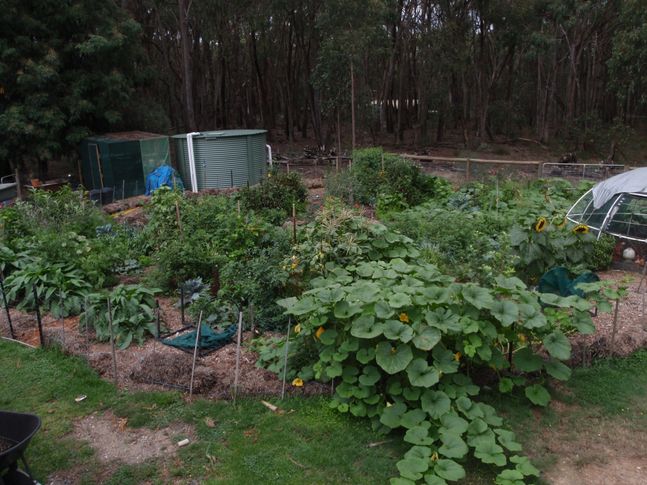- Subscribe to RSS Feed
- Mark Topic as New
- Mark Topic as Read
- Float this Topic for Current User
- Bookmark
- Subscribe
- Mute
- Printer Friendly Page
- Mark as New
- Bookmark
- Subscribe
- Mute
- Subscribe to RSS Feed
- Highlight
- Report Inappropriate Content
Mandala garden

- Mark as New
- Bookmark
- Subscribe
- Mute
- Subscribe to RSS Feed
- Highlight
- Report Inappropriate Content
Re: Mandala garden
In order

The chicken dome. They didn’t ever have much impact on the grass.

Slight setback after our first dust storm

Weeding out grass and composting

Weeding complete, path and drain construction

Paths filled with firewood waste bark, cover crops in, fenced.
- Mark as New
- Bookmark
- Subscribe
- Mute
- Subscribe to RSS Feed
- Highlight
- Report Inappropriate Content
Re: Mandala garden
Thanks for sharing @Kiwifr33. It would be interesting to see how the garden is going 11 years on. I hope you have garnered a lot of produce from it over the years.
Jason
- Mark as New
- Bookmark
- Subscribe
- Mute
- Subscribe to RSS Feed
- Highlight
- Report Inappropriate Content
Re: Mandala garden




The central habitat pond, ready for lining and filling. It got topped with a sheet of reinforcing mesh, which is about 2cm below the surface when the pond is dead full. Good for the kids, didn't have to fence it separately and they could reach through the mesh and catch tadpoles without ever being able to fall in.
- Mark as New
- Bookmark
- Subscribe
- Mute
- Subscribe to RSS Feed
- Highlight
- Report Inappropriate Content
Re: Mandala garden

Filling of said pond.

Filled, bordered and planted.

Arty

Now. It’s in there, trust me.
- Mark as New
- Bookmark
- Subscribe
- Mute
- Subscribe to RSS Feed
- Highlight
- Report Inappropriate Content
Re: Mandala garden

Orchard beginnings

Prepping for soil. It’s all on nasty granitic clay / sand / gravel. Basically really old turned over tailings - you can’t dig, you have to use a wrecking bar and then scoop it out.

Now. Had a big score about 15 months ago - our uphill neighbours are tropical fish farmers and need to discharge in excess of 5Kl of water per day. Pre-fertilised, and via hose so we can put it wherever we want it. We have a system of swales on contour that was originally to catch storm water: now it holds this water and soaks it in.
- Mark as New
- Bookmark
- Subscribe
- Mute
- Subscribe to RSS Feed
- Highlight
- Report Inappropriate Content
Re: Mandala garden
You were very lucky with the water situation @Kiwifr33! Can I ask, what are swales?
- Mark as New
- Bookmark
- Subscribe
- Mute
- Subscribe to RSS Feed
- Highlight
- Report Inappropriate Content
Re: Mandala garden
Couldn’t agree more @MartyH, the water came just at the right time.
A swale is a ditch and berm arrangement - pile what you dig out on the downhill side. The contour part is the most important, you can make your own landscaping levels to make sure the bottom of your swale is pretty much level. Google 'a frame level', or our favourite, because you can use it to level across wider areas or to make a particular 'fall', is the 'bunyip' water level. Used to bring storm water off the roadside at 1:100, dodging the big gums in between. Hours of fun...
There is a great book that my wife studied extensively before breaking out the shovel, https://www.bookdepository.com/Rainwater-Harvesting-for-Drylands-Beyond-2-Brad-Lancaster/97809772464... Your local library may well have it if you’re lucky, but if you’re short on water it’s worth $46...
Make sure you get volume II as it has all the goodies about constructing earthworks. The first one is all the principles and can basically be summed up as 'catch as much as you can, as many times as you can' and 'the cheapest place to store water is in the soil.'
Below is basically standing on the swale bank. The water 'plumes' underneath the soil, kind of in a teardrop / lens shape. We know it’s wet enough when it soaks out through the slope of the driveway,then we move the hose on.

- Mark as New
- Bookmark
- Subscribe
- Mute
- Subscribe to RSS Feed
- Highlight
- Report Inappropriate Content
Re: Mandala garden
Love all the photos. Thank you for sharing them.
Why join the Bunnings Workshop community?
Workshop is a friendly place to learn, get ideas and find inspiration for your home improvement projects



